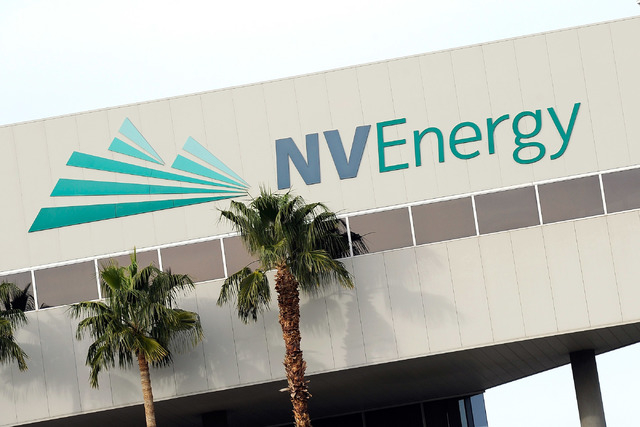Advocates accuse state, NV Energy of anti-solar bias


Nevada’s burgeoning solar industry on Wednesday accused NV Energy of trying to maintain its power monopoly by stifling a program that lets customers with rooftop solar arrays get credit for producing extra electricity.
The “net metering” program is now capped at 3 percent of all electricity users — a limit that’s expected to be met by the end of the year. NV Energy is accused of using its influence with Gov. Brian Sandoval and lawmakers to quash a bill that would have increased the cap to 10 percent, representatives of the solar industry charged.
“Their goal is to eliminate solar rooftop competition,” said Bryan Miller, co-chair of the Alliance for Solar Choice, noting that some 6,000 Nevada jobs tied to the solar industry are at stake. “NV Energy and its owner, Berkshire Hathaway, has been on a national agenda to eliminate solar” net metering by individuals. “It’s a jobs cap.”
Representatives of NV Energy and the solar industry met privately Wednesday to hash out issues related to the cap, insiders said, although it’s unclear if any agreement can be reached to change the limit.
Sen. Patricia Farley, R-Las Vegas, had introduced Senate Bill 374, which in its original form would have raised the current 3 percent cap to 10 percent, but she confirmed Tuesday that she has removed the language from her bill.
Sandoval said he remains neutral and was not involved in Farley’s decision to amend her legislation. “There was a rumor that I had somehow been involved in Sen. Farley’s decision not to introduce a bill and that is false,” he said Tuesday. “I am neutral.”
Sandoval said his staff has met with rooftop solar advocates as well as NV Energy and he will also meet with them to clarify questions about whether net metering is being unfairly subsidized by all residential utility customers.
Net metering allows customers who install rooftop solar to sell any surplus power to the utility.
A net metering study commissioned by the Public Utilities Commission found that there would not be a “substantial cost shift to nonparticipants due to (net metering) going forward given the current and proposed reforms to the program.”
Sandoval said he remains neutral on the issue because he has not reviewed that study and is meeting with the groups to get all necessary information.
A major issue is whether expansion of rooftop solar will mean higher rates for ratepayers who do not participate in the program, he said. There is also the question of the cost associated with the energy generated from rooftop solar sold to the grid, Sandoval said.
“There is a concern on one side that it will raise rates in order to do that,” Sandoval said. “I want to make sure I have all the information in front of me before I make a decision.”
Farley agreed there are too many complex questions pending for experts, including the PUC, before the cap issue can be addressed.
Farley said she is not aware of any current legislation to raise the cap, but nothing prevents the companies from installing rooftop solar without the net metering provisions.
The cap was increased from 2 percent to 3 percent in the 2013 legislative session.
NV Energy, one of the biggest campaign contributors in Nevada, has a lot of sway with state lawmakers and the administration. Sandoval’s top political advisers are also lobbyists for the utility.
Rooftop solar advocates, however, want an increase in the cap, which is based on the total peak capacity of all utilities in Nevada, so the industry can continue to grow.
The industry is rapidly expanding in Nevada and has been touted both by Sandoval and by Sen. Harry Reid, D-Nev.
Solar City, for example, received $1.2 million from the Governor’s Office of Economic Development to locate more than 1,000 employees in Las Vegas. But advocates argue that if the cap isn’t raised, companies such as Sunrun, American Patriot and Jersey Electric would no longer be able to operate their solar businesses in Nevada, killing 1,500 to 2,000 jobs.
Warren Buffett, the country’s premier investor, and his Berkshire Hathaway company now own NV Energy. In a strategy document written in 2014, the company outlined its position on net metering, saying it should be scrapped in favor of a system that recognizes utility fixed-grid costs and uses distributed generation when needed most.
Miller, the co-chair of the Alliance for Solar Choice, said Berkshire Hathaway and Buffett have tried to kill caps in several other states, “but have lost everywhere they’ve tried it,” including in Utah and Washington state.
“It’s the ultimate bullying of an industry that’s creating 6,000 jobs” in Nevada, Miller said. “They’ve been very clear they view rooftop solar as competition. Monopolists don’t like competition.”
The alliance planned a protest rally on Earth Day next Wednesday from 11 a.m. to 1 p.m. outside NV Energy’s headquarters in Las Vegas on West Sahara Avenue to bring attention to the issue.
“Let’s show our elected leaders that Nevada stands for a growing solar economy,” said an email to solar energy supporters asking them to join the protest and contact lawmakers.
NV Energy has not only resisted raising the cap, but has approached the PUC about someday charging higher rates to people who install solar systems.
NV Energy officials have publicly stated it’s not fair for people who can afford most of the cost for a solar system to get subsidized through power rebates by lower- to middle-income ratepayers who cannot afford such systems.
NV Energy representatives were not immediately available to comment for this article.
RELATED
Solar power company launches program for existing homes in Nevada
Increased use of solar power is evident, but some urge caution


















